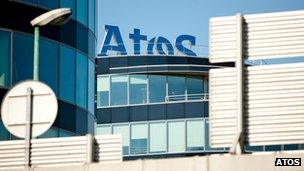Atos boss Thierry Breton defends his internal email ban
- Published

Mr Breton says he has no plans to force the internal email ban onto his firm's clients
Thierry Breton caused a sensation last week when he told an interviewer that he planned to ban internal email at the information technology services giant, Atos.
In fact the chief executive was only repeating a strategy he had alreadyoutlined earlier in the year, external.
Nevertheless, his comments sparked a series of editorials across the mainstream media and the blogosphere. The idea was described as both "bold" and "stupid", with some writers betting that the proposal would be ditched before the self-imposed 2014 zero-email deadline.
But Mr Breton is determined to add the move to his already impressive CV.
He is the former chief executive and chairman of France Telecom, served as France's minister of economy, finance and industry for two years and lectured at Harvard Business School before joining Atos three years ago.
Implementing the policy will be no small feat. Atos employs staff across 42 countries and offers consulting and technology services to a range of high profile customers including Boots, Fiat, Philips, Reuters and the Olympic Games.
Success could herald a turning point for email, failure would prove damaging for his company's credibility.
Against this backdrop Mr Breton explained the reasons for his move to the BBC.
Were you surprised by the attention your decision received?
Yes I was surprised by the interest - or let's say intrigue - that almost all our customers expressed.
In fact, I did it to enhance the quality of working conditions for our 80,000 employees.
This is part of a global initiative that we initiated in ATOS almost three years ago called "Wellbeing At Work" - a knowledge network made up of new talents in the company.
Their mission, in addition to their normal job, is to provide new ideas to enhance working conditions.
They put on the table the fact that most of the young people that we were hiring were not using email anymore after graduating from universities.

Atos's boss says his employees welcome the zero-email policy plan
They were instead mainly using instant messaging tools and social networks like Facebook - and for most of them, when they joined Atos it was first time they had ever worked with internal email tools like [Microsoft] Outlook.
So this intrigued me - and in addition I had already been thinking for many years that most of my colleagues and my employees were spending increasing amounts of time on internal emails.
I started to think they were spending too much time on internal emails and not enough time on management.
So when we put all this together I started an in-depth study with our consulting practice to see how many internal emails the 80,000 employees of Atos were receiving.
We found on average it was over 100 emails per day.
After further analysis, we realised they found 15% of the messages useful, and the rest was lost time.
But they had a fear that they would miss something.
We checked at work and at home also - and we realised they were spending 15 to 20 hours a week checking and answering internal emails.
So we launched a team to investigate what sort of tools we could use to replace internal emails and also what sort of management practices we should put in place to go back to what I believe would be a normal way to behave in a company.
And hopefully by the end of next year - which is something like 18 months [from the start] - we'll be close to having everything in hand to make this change.
When did you last use internal email?
A long time ago - I don't use internal emails anymore.
When I was the chairman of France Telecom I stopped using internal email because I was not happy with the way we used it.
When I was in the government I had no emails for security reasons.
So it's probably five to six years ago.
But I use instant messaging - and of course I use external email.
I have an external email address and we don't intend, of course, to end external email.
External email is a fantastic tool - it's a fantastic way to communicate between organisations.
But internally we want to go back to best management practices.
Why do you think your announcement struck such a nerve?
We are addressing, I think, a real issue of our time. We all understand what a data deluge means.
We know that the data a company collects and stores doubles every 18 months.
We know that more data was created over the past 10 years than since the beginning of humanity.
We are careful with what we send and receive externally, but internally you use it more and more as a communication tool, or to store your own content, or to protect yourself from your boss or whoever.
We are not using it the way it was intended to be used.
When you believe that a new technology will replace another one, then you create some debate and I think that's normal and good and the way we have to work in technology.
I didn't do this for external reasons.
Of course we have our own consulting practice which is helping us, and we believe that a large number of our customers are interested in seeing what we do, because they are facing the same problems.
At the end we may use this experience to help them as well.
But that was not my first intention at all. My first intention was to deal with this internal data deluge and to work with the tools that the young generation are using.

Me Breton believes the vast majority of internal email are a waste of workers' time
We are business technologists, so it's our mission at Atos to be front runner in this technology age.
What was the reaction of your own employees?
I think it was positive as they knew it was a big policy
Since making this announcement we've experienced a 20% decrease in our own internal email just because people have become more careful.
Most don't yet have the new tools that we are preparing for them.
We are running a pilot with the tools - some are internally designed, some are from third parties. We have 500 young people who are not using internal email anymore - and they just love it.
Do you have a message for other bosses wanting to make big technological changes?
When you are working in a technological company you have to be humble.
Humble in front of technology and humble in front of change management.
This is our environment and we understand that if some of our customers are facing the same problem, or have the same ambitions, we can help them move at their own speed
I won't say that in five years you won't have internal emails - businesses will probably continue to have internal emails for the next 10 to 15 years.
But some companies will move quickly to these internal social networks and instant messaging tools - and again this will be pushed by the young generation.

Atos plans to implement the internal email ban before February 2014
In Atos the average age of our workers is 35 years - we are a young company.
Every year we hire roughly 10,000 new employees, most of them are below the age of 30, living in universities and college - they don't use internal email anymore, they are using a lot of new tools.
We have to adapt ourselves to this new generation that will become our business colleagues tomorrow.
Do you have any doubts?
The first goal I set was to give three years to make the transition - that's a lot of time.
I don't want to hurt the organisation, but there's a lot of appetite and excitement for what we are doing.
When we don't have internal email anymore we will have fantastic new tools - a cloud computing environment, social networks, instant messaging, micro blogging, document sharing, knowledge community - these offer a much better approach for an information technology company.
My job as a CEO is always to try to try to see how we can learn to work differently, to use our technology better. That's my mission and that's my job as a CEO.
- Published25 November 2011
- Published2 June 2011
- Published13 February 2011